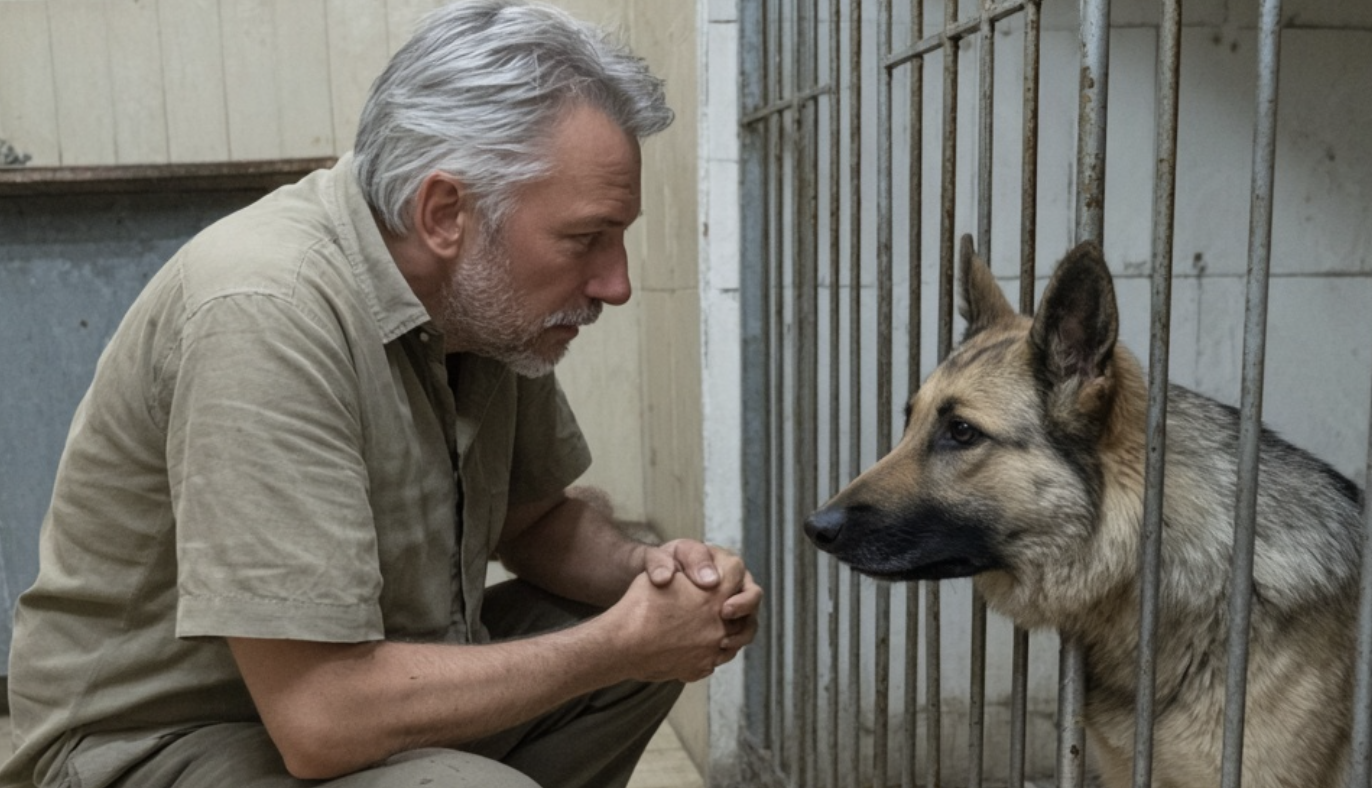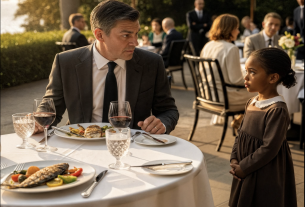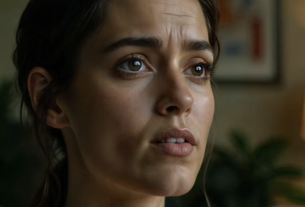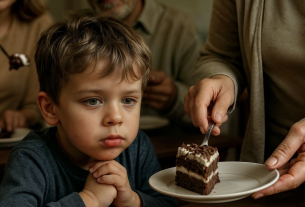In the farthest, darkest corner of the municipal animal shelter—where even the light from the fluorescent lamps seemed to fall grudgingly and thin—there lay, curled up on a thin, worn blanket, a dog. A German Shepherd—once, no doubt, strong and stately, and now a ghost of former might. His thick coat, once the pride of his breed, had matted into tangles, thinned in places by scars of unknown origin, and faded to an indeterminate ashen hue. Every rib jutted beneath the skin in a ghastly relief, telling a silent saga of hunger and privation. The volunteers, whose hearts had grown calloused over the years but had not turned to stone, called him Shadow.
The name was born not only of his dark coloring and his habit of squeezing himself into the dimmest corner. He really was like a shadow—quiet, almost soundless, invisible in his voluntary seclusion. He didn’t hurl himself at the bars when people appeared, didn’t join the deafening chorus of barks, didn’t wag his tail in a futile bid for a moment of affection. He only lifted his noble, graying muzzle and looked. He watched the feet passing his cage, listened to strangers’ voices, and in his gaze—extinguished and bottomless, like an autumn sky—there lived a single, nearly dying spark: a tormenting, exhausting expectation.
Day after day, life burst into the shelter in the form of cheerful families, with squealing children and the appraising looks of adults choosing a pet younger, prettier, “more sensible.” But by Shadow’s cage, the merriment always fell away. The adults hurried past, casting pitying or disgusted glances at his gaunt frame and dimmed eyes; the children fell silent, instinctively sensing the deep, ancient sorrow emanating from him. He was a living reproach, a reminder of betrayal—one he himself seemed to have forgotten, but which had carved itself forever into his soul.
Nights were the hardest time. When the shelter sank into a fretful, broken sleep—filled with sighs, whimpers, and the scrape of claws on concrete—Shadow would lower his head onto his paws and make a sound that clenched even the toughest night attendant’s heart. It wasn’t a whine or a howl of longing. It was a long, deep, almost human sigh—the sound of an absolute, bottomless emptiness, the scorched-out core of a soul that had once loved without reserve and was now slowly fading from the unbearable weight of that love. He waited. Everyone at the shelter knew it, looking into his eyes. He waited for someone whose return he no longer seemed to believe in himself, yet could not stop waiting for.
On that fateful morning a cold, nagging autumn rain had been lashing down since first light. It drummed on the shelter’s tin roof in a monotonous, soporific beat, washing out the colors of an already cheerless day. Less than an hour remained before closing when the entrance door creaked, letting in a gust of damp, penetrating wind. A man stood on the threshold. Tall, a little stooped, in an old flannel jacket soaked through, water trickling from it onto the scuffed linoleum. Rainwater dripped from his face, mingling with the tired creases at his eyes. He froze in hesitation, as if afraid to disturb the fragile, sorrowful atmosphere of the place.
The shelter’s manager, a woman named Nadezhda, noticed him—over the years she had developed an almost uncanny ability to tell at a glance who had come: just to look, to find a lost pet, or to gain a new friend.
“Can I help you?” she asked, her voice low, almost a whisper, so as not to startle the hush.
The man started, as if waking from a sleep. He turned to her slowly. His eyes were the red-ochre of fatigue and, perhaps, unshed tears.
“I’m looking for…” His voice creaked like a rusty hinge—the voice of someone unused to speaking aloud. He faltered, fumbled in his pocket, and drew out a small, timeworn, damp-laminated scrap of paper. His hands trembled noticeably as he unfolded it. In the yellowed photograph was he himself, many years younger—his gaze direct, no lines yet at the corners of his eyes—and beside him a proud, radiant German Shepherd with intelligent, devoted eyes. Both were laughing, bathed in summer sun.
“His name was Jack,” the man whispered, his fingers tracing the dog’s image with a tenderness that bordered on pain. “I… I lost him. Many years ago. He was… he was everything.”
Nadezhda felt something inside her twist into a hard, aching knot. She nodded, not trusting her voice, and gestured for him to follow.
They walked along the endless corridor, deafened by barking. Dogs hurled themselves at the bars, wagging their tails, straining to be noticed. But the man—who introduced himself on the way as Alexander Petrovich—seemed neither to see nor hear them. His sharp, taut gaze scanned each kennel, each figure curled in a corner, until they reached the very end of the hall. There, in the familiar gloom, lay Shadow.
Alexander Petrovich stopped dead. The breath hissed out of his lungs. His face turned deathly pale. Ignoring the puddle beneath his feet and the dirt on the floor, he dropped to his knees. His fingers, white with strain, gripped the cold bars of the cage. An unnatural, ringing silence fell over the shelter. It was as if all the dogs held their breath.
For several seconds—an eternity—neither he nor the dog moved. They simply looked at one another through the barrier, as if trying to recognize, in the altered features, the one they remembered as bright and alive.
“Jack…” The name slipped from Alexander Petrovich’s lips in a broken whisper, packed with such mute despair and hope that Nadezhda lost her breath. “My boy… It’s me…”
The dog’s ears, long since robbed of their former quickness, twitched. Slowly—unbelievably slowly, as if each motion cost him a terrible effort of will—he lifted his head. His faded eyes, clouded with age, fixed on the man. And in them, through the thickness of years and pain, a ray of recognition broke through.
Shadow—Jack’s body shuddered. The tip of his tail jerked once, uncertainly, as if trying to recall a gesture forgotten in years of despair. Then a sound burst from his chest. Not a bark, not a howl, but something between—a piercing, high, soul-rending keening in which years of longing, the pain of separation, doubt, and a mad, blinding joy all mingled. From the corners of his eyes, large, clear tears rolled down the gray fur.
Nadezhda clapped a hand over her mouth, feeling hot streams on her own cheeks. Drawn by that unearthly, heartbreaking sound, other staff began to gather silently from neighboring rooms. They stopped in place, unable to utter a word.
Weeping, Alexander Petrovich threaded his fingers through the bars, touched the coarse fur at the dog’s neck, scratched that very spot behind the ear—the one long forgotten.
“Forgive me, my boy…” he breathed, his voice gone entirely hoarse with tears. “I looked for you… every day… I never stopped looking…”
Jack, forgetting his age and the ache in his bones, edged up to the bars, pressed his cold, wet nose into the man’s palm, and sobbed again—pitifully, like a child—letting all the pain of those lonely years pour out.
Then the memories crashed over Alexander Petrovich like a wall of fire. Their little house on the outskirts, the creaking porch flooded with sunlight where they drank morning coffee together. The yard where young, lively Jack chased butterflies and then collapsed at his feet, breathing hard and happy. And that night. Black, smoky, smelling of soot and fear. Fire devouring everything in its path. Screams. He, Alexander, trying to fight his way through the smoke to his companion, his friend. A dull blow to the head, the fall. And the last thing he remembered—a neighbor dragging his limp body through a window frame, and Jack’s frantic, broken barking suddenly cut off… The dog had slipped his collar and vanished into the inferno. Months of desperate, fruitless searching. Flyers on every pole, endless calls, visits to every shelter in the district. Nothing. With the loss of Jack, he had lost more than a dog. He had lost a piece of his soul, his past, his only family.
Years passed. Alexander Petrovich moved into a cramped, faceless apartment and went on living by rote. But he always carried the photograph like a cherished relic. And when an acquaintance happened to mention an old German Shepherd at the city shelter, he didn’t dare believe. He was afraid—afraid of yet another disappointment. But he came.
And now he saw. In those old, dim eyes he saw the same fire of devotion. And he understood—Jack had waited. Through all those long, excruciating years, he had been waiting for him.
Stifling her own sobs, Nadezhda stepped forward and flicked the lock. The cage door swung open. Jack froze on the threshold, afraid to take a step, as if he feared this was a mirage that would dissolve at any moment. Then he took a step. Another. And, staggering, he lurched forward, pressing his emaciated, trembling body into his master’s chest.
Alexander Petrovich wrapped his arms around him, buried his face in the rough, shelter-scented fur, his shoulders shaking with silent sobs. Jack sighed heavily, old-man-deep and long, and laid his gray head on the man’s shoulder, closing his eyes. There they sat on the filthy, wet floor, with the rain howling outside and a hundred other dogs fallen quiet—two old warriors scarred by life, reunited after a long separation. Time stopped for them, dissolving in that embrace.
The staff stood in silence, not hiding their tears. In that scene each of them saw the embodiment of the purest, most unthinkable loyalty the world can hold.
“Take all the time you need,” Nadezhda whispered, barely audible. “And then we… we’ll prepare the paperwork.”
Alexander Petrovich only nodded, unable to tear himself away from Jack. Beneath his palm he felt the steady, strong beating of a heart—a heart that had been beating for him all these years. Ahead lay the same cramped apartment, but it would no longer be empty. It would be filled with warmth, with quiet sleeping breaths, and with that very gaze in which boundless devotion could be read.
That evening, signing the papers with a hand that trembled yet was firm, Alexander Petrovich left the shelter. The rain had stopped, and the autumn sun, breaking through ragged clouds, gilded the wet asphalt. Jack walked beside him without falling a step behind, his head held high, his tail swinging in a steady, dignified rhythm. His stride was firm, assured—the stride of a dog who had finally found his home.
They walked slowly, those two gray-haired warriors, leaving behind a past of pain and loneliness for a new future together. Their shadows—long and narrow—merged into one on the sidewalk flooded with sunset light. They were together again. And now nothing in the world could ever separate them.



